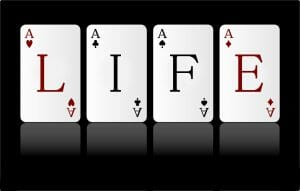That’s just the way it is. You’ve heard that said. Maybe you’ve even said it. But, is it?
It’s a human trait, I have observed, to learn something once and stick with that knowledge. Sometimes we figure out on our own how things really are. Even when things change, even when what we learned may not have been accurate then. How many outdated or imagined ideas do you have in your collection of knowledge?
 How much of what you know is myth or folklore? Topics like health, fitness, intelligence, the distribution of wealth, the environment, and longevity? Do you accept limitations on those ideas? Do you shrug and say “that’s just the way it is”?
How much of what you know is myth or folklore? Topics like health, fitness, intelligence, the distribution of wealth, the environment, and longevity? Do you accept limitations on those ideas? Do you shrug and say “that’s just the way it is”?
Are you willing to consider other possibilities?
For example, do you accept that your genetics dictate what your health and lifespan are with an attitude of “that’s the way it is”? Do you accept that few people live past 100, with an attitude of “that’s the way it is”? Oh, how about accepting the cultural wisdom that your intelligence is fixed at birth, with an attitude of “that’s the way it is”?
Could there be another story to those ideas? Could there be another way?
Yes, I think there is another way.
George Church, PhD researcher at Harvard Medical School, says that “all limits are negotiable”. I take that to mean that until we know more, then we renegotiate our wisdom base. This argues that the attitude of “that’s just the way it is”, is holding onto myth or even fiction.
Let’s start with how much impact genetics have on your health and lifespan. Yes, genetics do dictate, at least in part, how your body ages. For a long time, I accepted genetics dictated my life and knew that things would just be as they always had been in my family line. But, at about the time I realized I could easily live into my 100s, I realized that my attitude was part of my destiny.
Changing My Attitude
Living into my 100s came to me as a possibility when I figured that if my grandparents had outlived their parents, and my parents outlived their parents by even longer, then it stood to reason I’d outlive my parents. My parents lived into their 90s, about 13 years longer than their parents did. That gets me into my hundreds handily.
Knowing that mindset makes a big difference in how we live, I decided to start aiming for 150 as my final age. I may have to up that number.
So, my attitude is going to be part of my success in longevity. Science is the other part. Here’s an analogy to hang your thoughts on: your DNA is digital information while your epigenetics in analog information. Digital data, those bits of information, are fixed — for the most part. Environmental issues impact your analog data bits. I can impact my analog factors with healthy choices, and through a positive mindset.
When I say “positive mindset” here, I’m not talking about a blind faith attitude. I mean that I’m determined to live longer so will make wise choices in how I live. I’ll eat health-supporting foods. I’ll move frequently through the day. I’ll get good sleep. And I’ll connect with my community, laugh, and enjoy music. I’ll also take advantage of the advances science is making to help me live a long, vibrant life.
Do you want to live a healthier, longer life than your parents and grandparents? Then change your attitude, change your mindset, and make it happen. Make healthy choices. Pay attention to the science coming down the pike that will support your healthy choices. Enjoy!
Test your theories by asking if they can be different. Is your life based on “that’s just the way it is”, or on possibilities?
